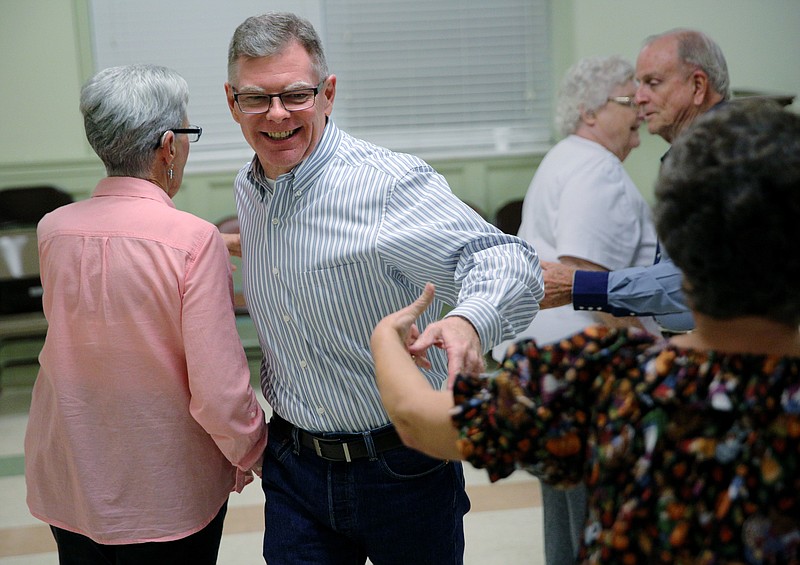Weight Watchers, the Atkins diet, low-carb, low-fat - Jerome Gordon tried them all.
"I had been on every kind of diet and weight-loss plan you could imagine," he said. But they all failed.
The 52-year-old had battled the bulge his entire life, and although some diet plans would help him temporarily shed the pounds, they'd return with a vengeance - to the point that his weight was "completely out of control."
Gordon was desperate, and far from alone.
In the United States, a record high 39.8 percent of adults are obese, according to a report by the National Center for Health Statistics. Obesity is defined as having a body mass index - a measurement of body fat based on height and weight that's often called BMI - equal to or greater than 30, and it's classified by the American Medical Association as a disease. It is linked to numerous medical problems, including Type 2 diabetes, high blood pressure, sleep apnea, bone and joint diseases, certain cancers and lower life expectancy.
One type of bariatric surgery, known as sleeve gastrectomy, is a laparoscopic procedure that's considered minimally invasive. It works by reducing stomach capacity and removing parts of the stomach that produce hunger-causing hormones so patients feel full sooner and less hungry overall.
Other bariatric procedures include gastric bypass surgery and the less-common gastric band.
Because of his BMI of 41.4, Gordon was a candidate for the gastric sleeve, but the thought of going under the knife terrified him.
"I knew people who'd had the procedure, and wondered if it was a good option, but kept thinking that I really didn't want to do something that severe," he said.
Gordon's surgeon, Dr. Jaime Ponce, medical director of CHI Memorial Weight Management Center, said that for people like Gordon, research shows that the most effective treatment for obesity is bariatric surgery.
"When somebody is struggling with obesity, they try to lose weight by many means, and as they get more overweight, it becomes more difficult," Ponce said. "It's very easy for us to tell them, 'Just go ahead and do exercise and diet,' but they cannot do exercise because of the weight."
Ponce has spent much of his career trying to educate and erase stigma surrounding obesity and bariatric surgery, such as the misconception that the surgery is strictly cosmetic.
"There's no patient that's going to do this for the looks," he said. "Most of the patients are going to lose enough weight to improve their health and their quality of life, but they're not going to lose enough weight to look like a model."
After two years of intense soul-searching, he underwent sleeve gastrectomy surgery last December to remove about 80 percent of his stomach.
In the months after surgery, Gordon's BMI fell from 41.4 to 24.8, he lost 107 pounds and over 15 inches around his waist. He now weighs less than he did when he graduated from high school.
"My only regret with the surgery is that I did not do it years ago," Gordon said. "I'm so thrilled that I did it, and if I had it to do over again, I'd absolutely do it."
While he's glad that clothes fit him and people compliment his appearance, he's more thrilled by how he feels.
"The two biggest things are the amount of energy that I have and the things that I can participate in that I could not before," he said. "One of my hobbies was square dancing, and I had to give that up, because I didn't have the energy and just really couldn't do it."
Before the surgery, Gordon took prescription drugs for high cholesterol, hypertension and used a CPAP machine for sleep apnea, but his health has improved so much that his doctors scrapped those therapies.
Part of Ponce's mission includes convincing more insurance companies to cover the procedure, which remains a barrier for patients seeking treatment. Although more are now covering bariatric surgery, many insurers don't or require patients to complete a lengthy approval process.
"They need to acknowledge that we have a disease, that's coded as a disease by any medical aspect codes, and it doesn't need to be discriminated against," Ponce said, adding that covering bariatric surgery could provide financial savings for insurance companies, since many medical conditions - like Type 2 diabetes - improve after the procedure.
A study by the American Diabetes Association found that diabetes care costs about $7,900 a person per year, and medical expenses for people with diabetes are about 2.3 times higher than people without the disease.
Insurance companies could recuperate their investment in a diabetic patient with bariatric surgery in about two to three years, according to Ponce.
Although bariatric surgery is often the best treatment for people who need to lose 100 or more pounds, it's not for everyone.
"It's a very effective tool, and people lose a lot of weight, but it depends a lot on how much they get involved," Ponce said. "If they don't learn how to use the tool, the surgery will make them lose weight initially, but then they will start getting some weight regain."
Surgery is not a cure all for obesity – patients that go through with the procedure also have to change their diet and exercise habits.
"We want them to be successful, and we know that it's a significant lifestyle change," said Karen Sarnosky, a nurse practitioner at the Erlanger Metabolic and Bariatric Surgery Center.
Support and counseling is a key component of bariatric surgery success.
Charles Schmittdiel is a psychologist at Erlanger Behavioral Health who provides pre-surgical psychological assessments and therapy for patients who are struggling to lose weight or adhere to treatment after surgery.
"Having the underlying belief that surgery alone will change your eating behaviors, without significant effort on your own part, unfortunately does not promote building better coping skills or necessarily a good outcome," he said. "People who are successful tend to make and maintain significant changes in their lifestyle, and are persistent in those behaviors."
Gordon said for him, attending seminars, getting the necessary support and researching the surgery options were key, but now, maintaining a healthy lifestyle is second nature.
"Do your research, know exactly what you're doing and become emotionally ready," he said. "The surgery is a tool in the toolkit, but my responsibility is to eat like I should and follow the rules and exercise every day."
Contact staff writer Elizabeth Fite at efite@timesfreepress.com or 423-757-6673.

